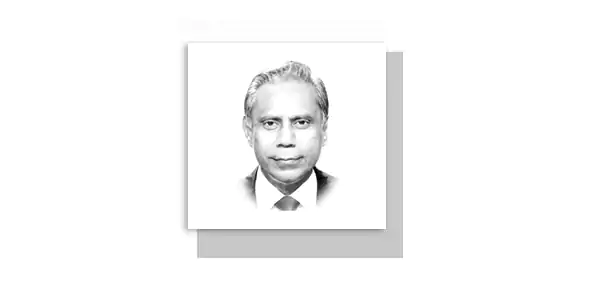THE world is still reeling under the impact of the ouster of autocrat Sheikh Hasina Wajed, who had been ruling Bangladesh ruthlessly for the last fifteen years. Bangladeshis themselves are surprised at how rapidly Awami League’s house of cards came tumbling down when the crunch came. Even Indian Prime Minister Narendra Modi and his notorious spy agency RAW were caught unawares. Former RAW chief I S Dulat, in an interview to an Indian TV channel, rued Hasina’s departure as the loss of a trusted partner.
On the other hand, India’s wily National Security Advisor (NSA) Ajit Doval is reportedly machinating to reverse the anti-Indian sentiments in Bangladesh. Sehr Rushmeen, a freelance analyst, in her Op-ed ‘Bangladesh’s Battle Against Subversion’ sheds light on Doval’s conspiracies to fuel discord and unrest in Bangladesh. The strategy employed by the Indian NSA and his team involves a combination of psychological warfare, influence operations, economic pressures, and covert intelligence campaigns. Doval’s sinister scheme is the manipulation of media narratives to undermine the credibility of the new leadership and create a climate of fear and uncertainty that could pave the way for a return to the status quo. The Indian NSA’s insidious plot, according to Rushmeen, includes active support for loyalists of the deposed Awami League regime to conduct a series of violent acts aimed at destabilizing the newly established order and pave the way for the Indian allies to re-enter the corridors of power in Dhaka.
The clock has turned a full circle from 1975 when Sheikh Mujib’s family was assassinated but his daughters Sheikh Hasina and Sheikh Rehana were spared because they were abroad when the coup d’état against their father took place. They duo sought asylum in India and returned to Bangladesh six years later when the dust had settled. This time, Bangladesh Army provided them safe exit otherwise the infuriated protesters would have lynched them.
In the current juncture, it is ironic because Hasina Wajed is accompanied by her younger sister Sheikh Rehana, who holds British citizenship. Both sisters sought asylum in the UK, although Sheikh Rehana’s daughter Tulip Siddiq is a member of the British parliament for the Labor Party, sadly, their request to the UK is in limbo as British foreign secretary David Lammy has called for an UN-led investigation into the deadly protests and “tragic” loss of lives in Bangladesh, with whom UK has “deep people-to-people links and shared Commonwealth values”.
Sheikh Hasina’s prolonged rule in Bangladesh was a period of anguish for Pakistan. Sheikh Mujib had pardoned the 195 members of the Pakistan Army who were wanted by Bangladesh for war trials and signed a tripartite agreement between Bangladesh, India, and Pakistan to normalize diplomatic ties. When Sheikh Hasina came to power, she reversed her father’s amnesty for the collaborators and repudiated the tripartite agreement of 1974. She resurrected the bogus claim of Pakistan Army personnel committing genocide of three million Bengalis, raping two million Bengali women. Not only did she demand that Pakistan formally apologize for the alleged genocide and rape but also sought war reparations from Islamabad. She instituted Bangladesh War Honour conferred to 13 heads of states and heads of governments and 486 Friends of Liberation War Honour to mock Pakistan.
During the interim period, when she was not in power, relations between Bangladesh and Pakistan were improving while the scars of the bloodstained severance appeared to be healing. Subsequent Bangladesh governments invited Pakistani industrialists to invest in Bangladesh while Pakistani educational institutions including PAF Public Schools Sargodha and Lower Topa offered seats to Bangladeshi youth to train in Pakistan. Unfortunately, the moment Sheikh Hasina was re-elected as Prime Minister in 2008, she cancelled all such agreements, recalled the Bangladeshi cadets and threw out the Pakistani industrialists causing them grave financial ruin. Her entire tenure was spent in spewing venom against Pakistan, opposing it at every forum at the behest of India to embarrass Pakistan. Making a mockery of justice, she established a sham court named the International Crimes Tribunal (ICT) to take punitive action against her political opponents, labelling them “Razakars” or collaborators of the Pakistan Army.
In my previous article titled: ‘Sheikh Hasina capitulates to “Razakars” I had written how the term “Razakar” came to haunt Sheikh Hasina when she mocked the students protesting against her ruthlessness and they became her bête noire. Matters did not rest there; the protesting students tore down the statue commemorating the Commander of Pakistan Army’s Eastern Command Lieutenant General Amir Abdullah Khan Niazi signing the instrument of surrender before the Indian Armed Forces after the 1971 war. The Bengali students had earlier razed the iconic statute of Sheikh Mujibur Rahman to the ground and torched the Mujib Museum, negating Sheikh Hasina’s narrative of building a larger-than-life image of Sheikh Mujib and the veterans of the “Liberation War” for whose descendants she had reserved employment quotas, which irked the Bengali educated youth deprived of job opportunities. The students considered the surrender statute as representing unlawful Indian intervention and a mockery of the events of the birth of Bangladesh.
In a turn of events, this Independence Day in Pakistan, more flags of Bangladesh were sold by vendors than the Pakistani ensign as they were in great demand. History has provided a unique opportunity. While the interim government in Bangladesh is struggling to restore normalcy and rebuild the economy, Pakistan and Bangladesh can attempt to achieve better relations.
—The writer, Retired Group Captain of PAF, is author of several books on China.










